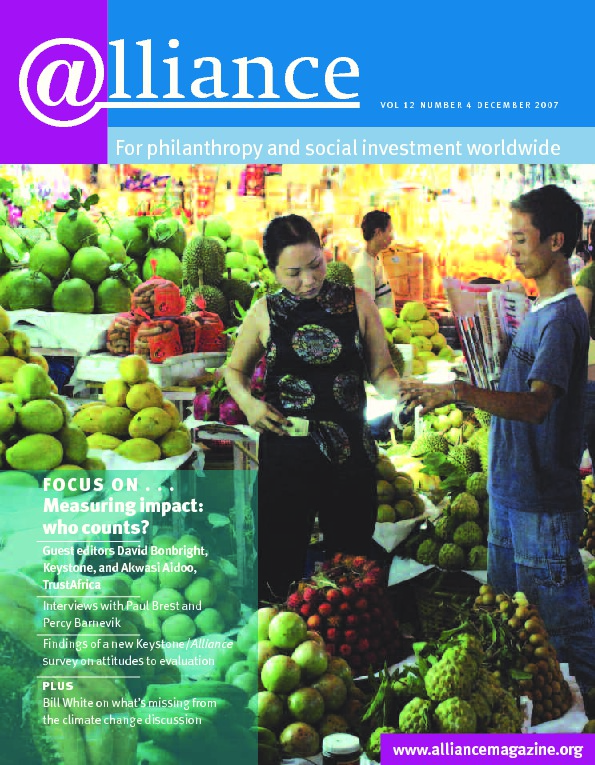Congratulations are in order for highlighting the timely topic of climate change in the September 2007 issue of Alliance. However, when climate change and the actions needed to address it are discussed, we sometimes fail to recognize a critical leverage point – the public and private financing that fuels international development, especially international investments in the energy sector and in infrastructure projects.
Charles Stewart Mott Foundation grantees are working in more than 20 countries, across six continents, to educate decisionmakers at public and private financial institutions about the impacts of their investment choices and to help communities speak out in favour of sustainable alternatives. Their work is critical to our planet’s climate future – and I would urge other private foundations to consider funding in this area.
As the world economy grows and becomes ever more interconnected, pressure increases to find new sources of oil and gas and to expand access to those resources. There is a corresponding demand for new infrastructure that will allow goods and resources to be moved from source to market. The investment decisions that countries are making about infrastructure and energy resources will have ramifications for at least 50 years and are likely to impact permanently vulnerable ecosystems.
Tropical forests are particularly at risk. The Amazon and other intact rainforests in Africa and Asia play a vital role in maintaining the integrity of the earth’s climate. According to the UN Intergovernmental Panel on Climate Change, which shared the 2007 Nobel Peace Prize for its work in this field, current deforestation and land-use practices contribute 20-25 per cent of the carbon emissions that cause climate change.
The construction of roads, pipelines and processing facilities associated with oil and gas extraction opens these intact forests to logging and settlement, with extensive deforestation the likely result. Deforestation also advances when forests are converted for agricultural production, including growing crops for biofuel production. Thus, an alternative fuel source promoted as part of the climate change solution could exacerbate the problem.
It is possible to influence investment decisions by injecting a sustainable development perspective into the process. Large-scale energy and infrastructure projects in emerging economies are often funded by a mix of sources, including the World Bank Group, export credit agencies (ECAs) and/or private banks.
Environmental and social safeguard policies at public international financial institutions (IFIs) provide an entry point for influencing the design and implementation of projects they support. Non-profits in Asia, Europe, North America, South America and elsewhere are not only monitoring application of these safeguard policies but also working to shift the IFIs’ portfolios into an expanded investment in alternative energy.
The IFIs should be partners in mitigating the impacts of climate change and avoiding further damage. Unfortunately, recent trends in their investments are worrisome, reflecting renewed interest in extractive industries, large-scale dams, and oil and gas pipeline projects. There is a continued need to shine a light on the investment decisions of the World Bank, other multilateral banks and ECAs, urging those institutions to forge a more climate-friendly energy path.
Private financial institutions can contribute to climate change solutions as well. The Mott Foundation applauds Citigroup and other private banks that have adopted the Equator Principles – voluntary guidelines that influence their management of social and environmental issues in project financing. These banks have shown leadership by signing on to a shared set of sustainability principles. But civil society and local communities must remain vigilant to ensure that these principles are translated into lending practices that promote economic growth, environmental protection and human well-being.
In coming years, the leadership of international public and private financial institutions will become even more vital in addressing climate change. As was noted in the Alliance special feature, Brazil, India and China are critical for any real solutions to climate change. They, as well as other developing countries, must have access to international finance that allows them to make good energy choices for the future.
William S White is president of the Flint, Michigan, USA-based Charles Stewart Mott Foundation, which has funded in the field of sustainable development since 1988. Email info@mott.org



Comments (0)